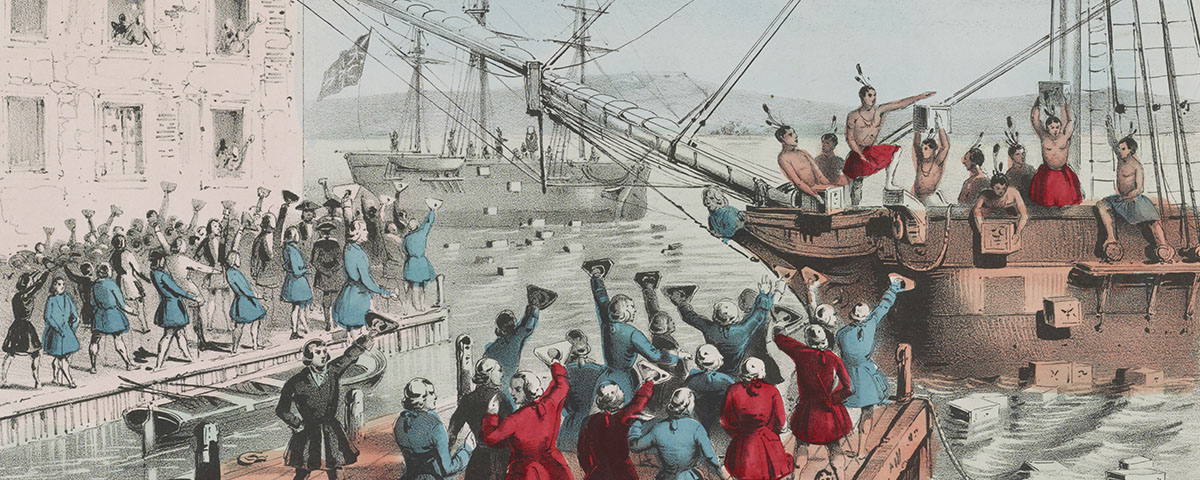MHQ researcher Marc De Santis shows how taxes have sparked conflict throughout history.
Teutoburg Forest, AD 9
If the Roman Empire’s plans succeeded, neighboring Germania would soon be just another province. Rome’s tax collectors were already busy exacting their harsh toll from the freedom-loving Germans. One Cherusci chieftain, Arminius, resolved to put a stop to it. A former auxiliary officer, he lured Roman general Publius Quinctilius Varus and his three legions into a deadly trap. All three were destroyed by German tribesmen in the dark Teutoburg Forest, Varus fell on his sword, and Roman expansion halted at the Rhine.
The Bagaudae in Gaul, 3rd Century AD
Rome’s tax collectors were also loathed by the empire’s citizens. Thousands of destitute peasants sought to escape from their brutish tactics and rose in revolt. The emperors had more pressing problems, so marauding bands of these peasants, known as bagaudae (fighters), survived for a while. But as Rome’s frontiers stabilized, the government turned its attention to them, and in 286, crushed the uprising.
Jacquerie Revolt, 1356
The lot of a French peasant was not a happy one after France’s defeat at the Battle of Poitiers in 1356. The aristocracy, whom the peasants blamed for King John’s capture at the battle, made them pay a land tax and provide free labor on public projects. Further, mercenaries released from English service were pillaging the countryside. The last straw came when the peasantry was forced by law to protect the noblemen’s castles. The peasants (nobles called them “Jacques”—the term for the padded vests the peasants wore) rebelled, and hundreds of nobles were slain. The vengeance of the aristocracy was more terrible still, and some 20,000 peasants died when the “jacquerie” was ended.
English Peasants in Revolt, 1381
Richard II levied several poll taxes on his subjects to pay for the ruinously expensive Hundred Years War. None were at all popular. In June a revolt broke out in Essex and soon spread across England. Rebellious peasants marched on London itself, and they extracted concessions from the young king. Richard complied merely to buy time, however, and the London militia quickly quashed the revolt. Around the kingdom, some 1,500 peasant rebels were slain as the Crown reasserted control.
Turkish Uprising, 1527
Wars on the frontiers of the Ottoman Empire strained even the resources of Suleiman the Magnificent. His tax collectors were sent out to raise more revenue, but many of them assessed the land higher than its legitimate value and kept the difference in collected taxes for themselves. An ex-Ottoman cavalry officer named Kalender Celebi led a massive revolt in Anatolia that required the sultan’s elite janissaries to defeat it in battle.
Ship Money, 1634
England’s King Charles I needed money to rebuild his navy and in 1634 imposed an ancient tax known as “ship money” on the country’s coastal communities. In 1635 the area of taxation was extended 15 miles inland. Since the country was at peace, many saw the tax as a gross overreach of an arbitrary monarch and opposition was fierce. The king eventually gave up, but the damage had been done and the tax became one of the underlying causes of the English Civil War.
Tea Party, 1773
No one likes taxes, least of all Americans. The British learned this when they imposed tax after tax on the American colonists. Parliament went a step too far when it imposed a tax on tea. In December 1773 outraged Bostonians climbed aboard three merchant ships and tossed their cargoes of expensive tea overboard. Anger over taxes imposed without colonial representation in Parliament ignited the fuse that would in time result in the American Revolution.
Liberté, Egalité, Fraternité, 1789
Helping out in the American Revolution left France with heavy debts. A proposal to raise more money by taxing aristocrats and churchmen failed. The Estates-General was called to session in May, and matters quickly spiraled out of control. The Third Estate, representing the common people, declared that it would become the new national legislature. An angry crowd stormed the Bastille that July, and the French revolutionary wars against the conservative monarchies of Europe began in 1792. The series of conflicts arising from the events of 1789 would not end until the Battle of Waterloo in 1815.
White Lotus Rebellion, 1796
The poor peasants of mountainous central China erupted in rebellion against their non-Chinese Manchu masters. The cause was harsh taxation, and the White Lotus Society, a Chinese Buddhist sect aiming to overthrow the Manchu, led the uprising. For a time the peasants were able to fend off the poorly trained imperial troops. But by 1804 a combination of reinforcements and stringent anti-insurgency tactics had crushed the rebellion.


.jpg)



